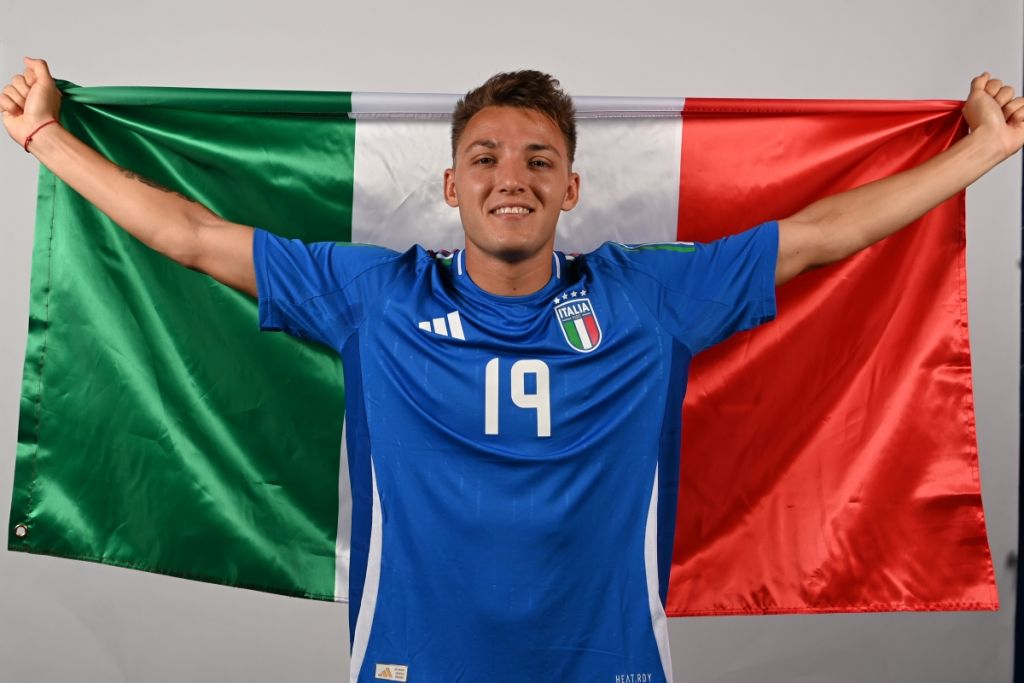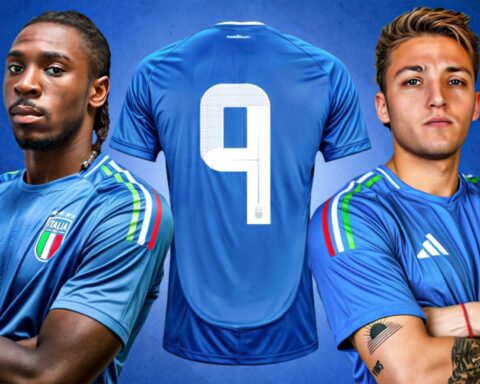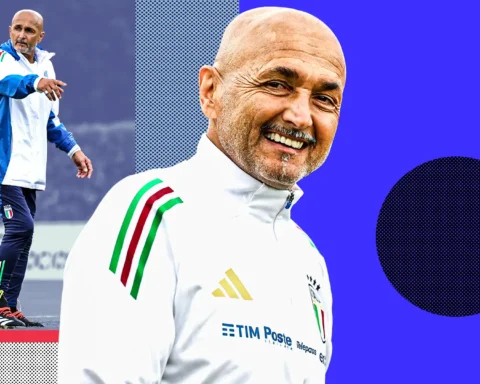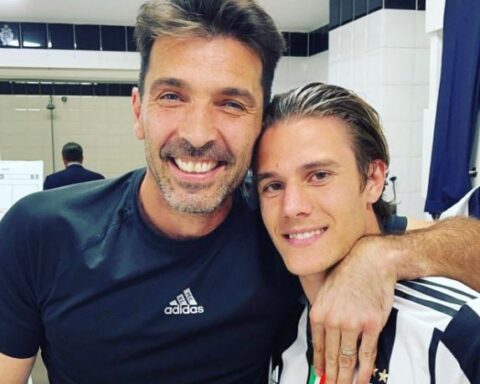Italy forward Mateo Retegui believes no one wants to face this Italy side: “We are reigning European champions and four-time world champions.” The Azzurri kick-off their defence of the European Championships on Sunday evening, facing Albania in their first group game. Speaking with La Gazzetta dello Sport, Argentine born Retegui explained the importance of playing for the Azzurri, learning the national anthem, and defending the shirt:
And so let’s begin. Do you look around and feel a sense of home?
“Yes. It’s wonderful here. It’s thanks to my great-grandparents; my mother’s side was originally from Canicattì, which is why I play for Italy today.”
Did your family tell you about them, how and why they came to Argentina?
“We have old documents at home that tell their story, but we don’t really talk about it. I don’t ask because I prefer living in the present and looking towards the future rather than the past. And truth be told, I don’t even know, or maybe don’t remember, their names… (smiles a bit embarrassed). But my dad and I have already agreed that as soon as he returns to Italy, we’ll visit Sestri again to see my great-grandfather’s house, which is still standing. At least I know that much!”
Gudmundsson looked up Genoa on the map, having never heard of it before. But you knew where you were going…
“I knew I was joining a team with a rich history, where strong Argentinians like Diego Milito played. Today I want to thank everyone: the club that wanted me, Coach Gilardino who called me during negotiations to tell me he believed in me, my teammates who helped me settle in quickly, and the fans, so passionate they seem Argentinean. When we play at the Ferraris Stadium, we become truly formidable. Scoring under the Nord is beautiful, especially when the announcer repeats my name many times after a goal.”
In Argentina, you played for Boca…
“A bit.”
…but you played there. You must know that in the La Boca neighborhood of Buenos Aires, there are many descendants of Italian immigrants, especially from Liguria. Was it destiny for you to come to Italy, specifically to Genoa?
“I think everything that happens to us is destiny. For example, I played my first match with the national team at the Diego Armando Maradona Stadium in Naples, and everyone knows what Maradona means to us Argentinians. I debuted and even scored against a strong opponent like England. If that’s not destiny… My story is all a series of coincidences, as if someone had written it for me.”
Are the emotions from your first time with the Azzurri still alive, the anthem and everything else?
“They were the same emotions I still feel today. It’s always an honor to wear the national team jersey, and I want to defend it to the death. My debut didn’t go as I hoped because I’m someone who always wants to win. But playing and scoring at the ‘Maradona’ will always stay with me.”
And the anthem, have you learned it?
“Claro que sí. I already knew it. I sing it well, haven’t you heard me? (starts singing: Fratelliii d’Italiaaaa…). I know it all, but that’s enough because I’m embarrassed.”
What did Coach Mancini say the first time you met him?
“I arrived at midnight and he was waiting for me. ‘Do you know why you’re here?’ ‘To play.’ ‘To play, yes, but above all to score.’ ‘Perfect, that’s what I live for.’ He trusted me against England and Malta, and I repaid him with two goals.”
And Spalletti, what does he ask of you?
“He has a very strong personality, hot-blooded like me. We’re both competitors who have winning in our minds. Compared to him, Mancini was a bit calmer. With a new coach, competition among players increases.”
From one to the other, what changes in your style of play?
“Let’s say he asks me to help the team even when we don’t have the ball, pressing the defenders. But I play in a position where the most important thing is to score goals. At Estudiantes, I was coached by Gabriel Milito. He told me, ‘You have to score goals. I don’t know how, but you have it in your head.’ He was right: I always want to score, always. When I don’t score, I’m upset. I know I can’t do it every time, but I definitely try. And one thing is for sure: we are a very strong team, we can achieve great things at the Euros.”
Why are we strong?
“Because history says so. We are reigning European champions and four-time world champions. Who wants to play against Italy? No one.”
Have you always played as a center-forward?
“No, as a child I played as a midfielder. Saturno switched me in the Boca youth teams.”
In the national team’s American tour, you scored a brace against Venezuela and all the newspapers wrote that Italy had found the center-forward for the Euros. Then Scamacca started scoring too, and now you are competing for the center-forward spot in the national team.
“I know I have to stay calm, keep my feet on the ground and work, because I am very demanding of myself and I can improve in everything. Scamacca has great qualities to play alongside other strikers too, but I don’t like to make comparisons between him and me.”
Who have you bonded with the most in the national team?
“Jorginho and Donnarumma, but I talk to everyone.”
Honestly, if Scaloni, the coach of Argentina, had called you, would you have said yes?
“I can’t answer because he never called me. I genuinely thought he would, because I had scored a lot in Argentina, but instead it was Mancini who called me, and I didn’t hesitate for a moment; I immediately said yes. I took the first plane and showed up.”
What’s Italian about you?
“I feel Italian. I’ve lived my whole life in Argentina, but here I feel at home.”
You said earlier that it’s as if someone had written the story you’re living today in advance: do you believe in God?
“Yes. But I’ve done a lot, worked hard to be here. With the support of my parents and my sister, who have helped me become a better person and a better footballer, I’ve reached where I am now: in Italy and in the national team. I believe that when someone desires something so much and fights for it, in the end, they achieve it. Today I’m living a dream.”
How have your parents helped you?
“Football is a very tough world: one day you’re way up high (raises his hand above his head), the next you’re down low (lowers it almost to the ground). The people around you, your family, become very important. In Argentina, I played for four teams: Boca, the most important club where I only played once; then Estudiantes, Talleres, and Tigre. It didn’t go well in some of these teams, and in those times, my family’s support was crucial for me to not lose my way and to keep walking tall. Just like in Genoa: as soon as I arrived, everything was great because I played and scored. Then two knee injuries came that hurt me mentally too. My parents came to Italy to be by my side: I was scared and they comforted me, talked to me a lot. ‘Come on, Mateo, you can do it,’ they repeated. I will never stop thanking them.”
Do you need so much help from others to get through tough times? Do you feel you need to grow in character?
“Playing football has helped me build character, just as I said before: one day you’re up high, the next you go down. If you don’t have character, football will pass you by. I’ve experienced good and bad moments, and if I hadn’t had strength within me, the support of others, even if it’s my loved ones, wouldn’t have been enough.”
What kind of child were you?
“Calm. My mom still tells me I was good sitting in the highchair. And today I’m the same: I like being at home drinking mate and watching matches on TV.” He repeats: “I’m a very calm guy.”
Have you taken more kicks in Italy or in Argentina?
“Here. I get a lot of knocks, and referees don’t whistle many fouls in my favor” (smiles).
Do you have a favorite team?
“Tigre, Victoria club. Diego Martinez, the coach, gave me the push to get here, the trust every player needs. He changed my life. And then Mom and Dad live ten minutes from the stadium, I used to walk there. Sooner or later, I’ll go back there, not to finish my career, but when I still feel strong.”
Mateo, do you play PlayStation?
“No, I don’t play (laughs cunningly). I heard what Mr. Spalletti said (about players staying up late playing video games), and as my father says, an coach’s words are sacred.”




